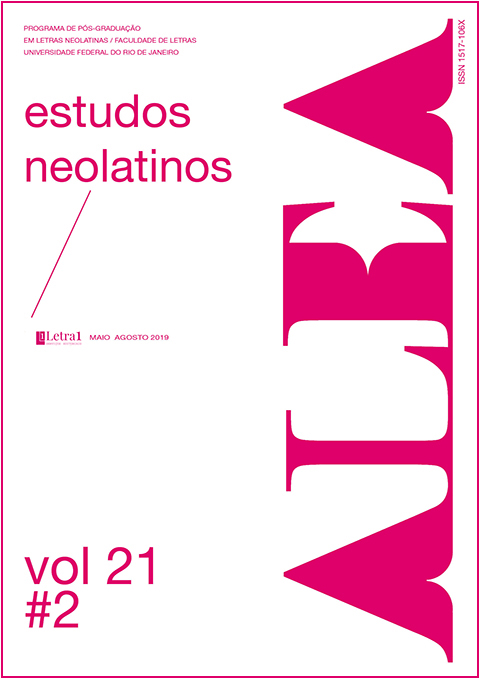Memórias, “analogias e transposições poéticas”
Abstract
Em Pequenos poemas em prosa: o spleen de Paris (1869), precisamente em “O quarto duplo”, Charles Baudelaire relacionou a memória ao tempo com uma nota de amargura: “O Tempo reapareceu; o Tempo agora reina soberano; e com o hediondo velho voltou todo o seu demoníaco cortejo de Lembranças, Desgostos, Espasmos, Medos, Angústias, Pesadelos, Raivas e Neuroses”. Alguns anos mais tarde, com uma abordagem especulativa inspirada por autores como Baudelaire e Gérard de Nerval, a obra de Marcel Proust atribuiu relevância e novas possiblidades de análise ao tema da memória como viagem no tempo. Na literatura brasileira, influenciado pela similaridade das perspectivas de Baudelaire e Proust sobre o tópico, Pedro Nava explorou a ideia da memória como mecanismo criativo e poético. Comparando excertos das obras de Baudelaire, Proust e Nava, este ensaio pretende examinar a noção de memória evocativa discutindo-a como elemento essencial do processo de composição literária.
References
ASSIS, Machado. Dom Casmurro. São Paulo: Abril Cultural, 1978.
BACHELARD, Gaston. A poética do espaço. São Paulo: Martins Fontes, 2000.
BAUDELAIRE, Charles. As flores do mal. Tradução, introdução e notas de Ivan Junqueira. Rio de Janeiro: Nova Fronteira, 2012.
BAUDELAIRE, Charles. Pequenos poemas em prosa[O spleen de Paris].Tradução de Dorothée de Bruchard. São Paulo: Hedra, 2007.
BAUDELAIRE, Charles. “The Double Bedroom”. In: Paris Spleen: Little Poems in Prose. Translation, preface and notes by Keith Waldro: Middletown, CT: Wesleyan University Press, 2009, p. 9-11.
BONNEFOY, Yves. Baudelaire: La tentation de l’oubli. Paris: Bibliothèque nationale de France, 2000.
COMPAGNON, Antoine. Baudelaire devant l’innombrable. Paris: Presses de L’ Université de Paris-Sorbonne, 2003.
CORBANI, Valentina. Saggi sparsi su Proust. Napoli: LaRecherche Edizioni, 2012.
HEERSMINK, Richard. The narrative self, distributed memory, and evocative objects.Synthese: International Journal for Epistemology, Methodology and Philosophy of Science, 194 (8), Dordrecht: Springer Netherlands, 2017, p. 3135-3151.
LEONEL, Maria Célia de Moraes. Guimarães Rosa: Magma e gênese da obra. São Paulo: Editora Unesp, 1999.
NAVA, Pedro. Baú de ossos. Rio de Janeiro: Livraria José Olympio, 1974.
PROUST, Marcel. O tempo redescoberto. Tradução de Lúcia Miguel Pereira. São Paulo: Globo, 2013.
RICOEUR, Paul. La mémoire, l’histoire, l’oubli. Paris: Seuil, 2000.
RICOEUR, Paul. “The Function of Fiction in Shapig Reality”, Man and World, XII/2, Leiden: Martinus Nijhoff Publishers, June 1979: 123-141.Disponível em: <https://doi.org/10.1007/BF01252461>. Acesso em: 12/01/2019.
RICOEUR, Paul. Time and Narrative. Volume I. Translated by Kathleen McLaughlin and David Pellauer. Chicago and London: The Universityof Chicago Press, 1990.
ROSA, João Guimarães. “Aletria e Hermenêutica”. In: Tutameia. Rio de Janeiro: Livraria José Olympio, 1976: 3-12.
SCHECHTMAN, Marya. Personal identity and the past. Philosophy, Psychiatry and Psychology, 12 (1), Baltimore, Maryland: John Hopkins University Press, 2005, p. 9-22.
ZANETTA, Julien. Will and Indolence: “Proust, Reader of Baudelaire”. In: Sætra, Lars; Lombardo, Patrizia; Linkis, Sara Tanderu. (eds.). Exploring Text, Media, and Memory. Finlandsgade: Aarhus University Press, 2018, p. 467-492.
ZIMMERMAN, Melvin. Charles Baudelaire: Petits poèmes en prose. Manchester: Manchester University Press, 1968.
Downloads
Published
Issue
Section
License
THE AUTHOR/S confirm/s his, her or their participation in all stages of work preparation: 1) Conception, project, bibliographical research, analysis and interpretation of data; 2) Writing and reviewing the manuscript; 3) Approval of the final version of the manuscript for publication; 4) Responsibility for all aspects of the work and guarantee for the accuracy and integrity of any part of the work. The submission of works implies the immediate cession, without onus, by all authors, of publication rights to the journal Alea, licensed under CC BY (https://creativecommons.org/licenses/by/4.0/). The authors are fully responsible for the content of the article and continue to hold all copyrights for subsequent publications of it, and should, if possible, include the reference to the first publication in the journal. Alea does not commit to returning received contributions. Authors of articles, reviews or translations will receive a copy of the journal.

